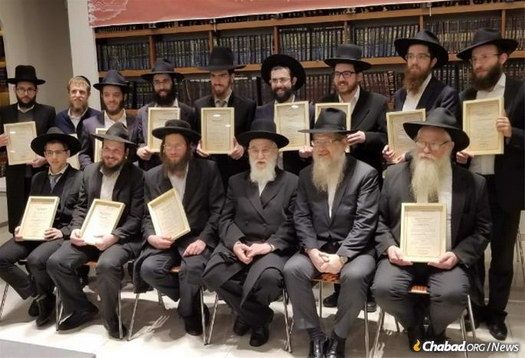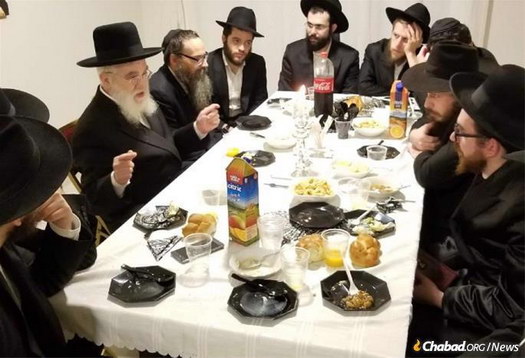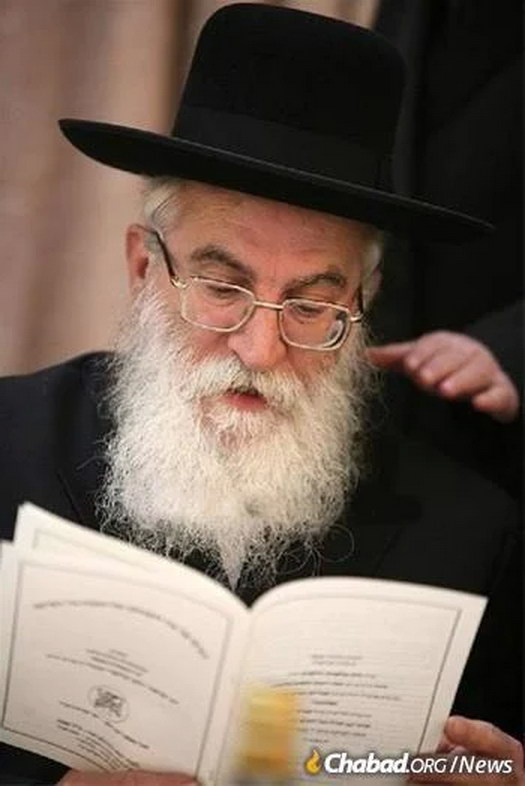
Obituary: Rabbi Chananya Eisenbach, 77, Renowned Yeshivah Head and Prolific Scholar
by Aharon Loschak – chabad.org
Rabbi Chananya Yosef Eisenbach, a renowned Chabad-Lubavitch rosh yeshivah (academy head) and author of many scholarly Torah works who served Jewish schools and communities in Israel and Argentina, passed away on Feb. 12 due to complications from the coronavirus. He was 77 years old.
Born in 1943 in the religious Beit Yisrael neighborhood of Jerusalem to Rabbi Shimon Benzion and Chana Eisenbach, he learned in the famed Lithuanian-style Ponovezh Yeshivah in Bnei Brak, and thereafter transferred to the Chabad Yeshivat Torat Emet in Jerusalem, where he studied under some of the city’s most prominent Old World scholars. From the ancient alleyways of Jerusalem, he moved on to the Chabad Yeshivah in Kfar Chabad, drinking from the waters of the legendary educator Rabbi Shlomo Chaim Kessleman. In 1965, he traveled to New York and joined the central Chabad-Lubavitch yeshivah at 770 Eastern Parkway in Brooklyn, where he was deeply influenced by the personal guidance of the Rebbe—Rabbi Menachem M. Schneerson, of righteous memory.
In 1969, the young scholar married Bracha Elka Berenshtein, the daughter of Rabbi Aharon Berenshtein, rosh yeshivah of Yeshivah Chayei Olam in Jerusalem, and a member of Israel’s Moetzet Gedolei HaTorah (Council of Torah Sages), the rabbinical policy-making council of Agudath Israel.
Eisenbach was appointed rosh yeshivah of the Chabad yeshivah in Kiryat Gat; from there, he assumed a series of leadership positions in yeshivahs and prestigious kollels (advanced study academies) in Israel, often simultaneously. The later part of his life was spent in Argentina, where he served at the helm of the Ohel Yosef Moshe Kollel in Buenos Aires.
In addition to his institutional leadership, Eisenbach served as an editor of the Talmudic Encyclopedia project, a long-standing ongoing endeavor that began in 1942 under the guidance of its first editor-in-chief, Rabbi Shlomo Yosef Zevin, and has since featured many illustrious Torah scholars as editors and contributors.
Known to be of brilliant mind and memory—a paragon of Old World-style Torah erudition—Eisenbach was a prolific author, writing many books under the eponymous title Machane Yosef, along with many scholarly essays in various journals and periodicals over the years.
As a widely respected world-class scholar, Eisenbach sometimes served as a liaison between the Rebbe and many leaders in the Torah world. His door was the address to which many of his colleagues turned to arrange meetings on matters of importance, and he faithfully delivered many letters and messages back and forth between the Rebbe and rabbinic authorities in Israel.
The late Rabbi Zalman Gurary, a prominent Chabad Chassid who took an interest in bringing the Rebbe’s word to other rabbinic leaders, relates in a biography published recently a particular incident in 1976 with Rabbi Simcha Zissel Broida, the rosh yeshivah in Hebron. The Rebbe was strongly advocating at that time against giving away parts of Israel, insisting that such matters were best left to be decided by military personnel.
Rabbi Broida, among others, felt otherwise, and Rabbi Gurary approached Rabbi Eisenbach to arrange a meeting between the two. It was in the summer of 1976, just before 20 Av, which marks the anniversary of the passing of the Rebbe father, Rabbi Levi Yitzchak Schneerson, of righteous memory. Their conversation lasted quite a while, with much give and take. Gurary and Eisenbach relayed the conversation back to the Rebbe, laying out Rabbi Broida’s counterarguments and claims.
They were all very surprised to hear later that same day on a live broadcast from New York how at a public farbrengen for his fathers’ yahrtzeit, the Rebbe went into great detail to address each one of Rabbi Broida’s claims. No name was mentioned, of course, but Eisenbach and Gurary knew exactly what was going on.
Rabbi Zalman Farkash is a teacher and community leader in Buenos Aires. He writes: “Rabbi Eisenbach brought tremendous joy to the Rebbe, acting as he did to bring honor to Chabad in many circles and spread the Rebbe’s teachings as far as possible, particularly to the accomplished Torah community.
“For a number of years now, we were privileged with an incredible gift. His scholarly classes, uplifting farbrengens, rich storytelling and modest, pious conduct uplifted the entire city. We are now like orphans who have lost their father.”
In addition to his wife, he is survived by children Mrs. Leah Belinow (Elad, Israel) and Rabbi Shimon Eisenbach (Brunoy, France), as well as many grandchildren.
He is also survived by his brothers Rabbi Sholom Leib Aisenbach (Montreal, Canada), Rabbi Avrohom Eisenbach (Jerusalem) and Ahuva Rosenvasser (Bnei Brak).
This article has been reprinted with permission from chabad.org













